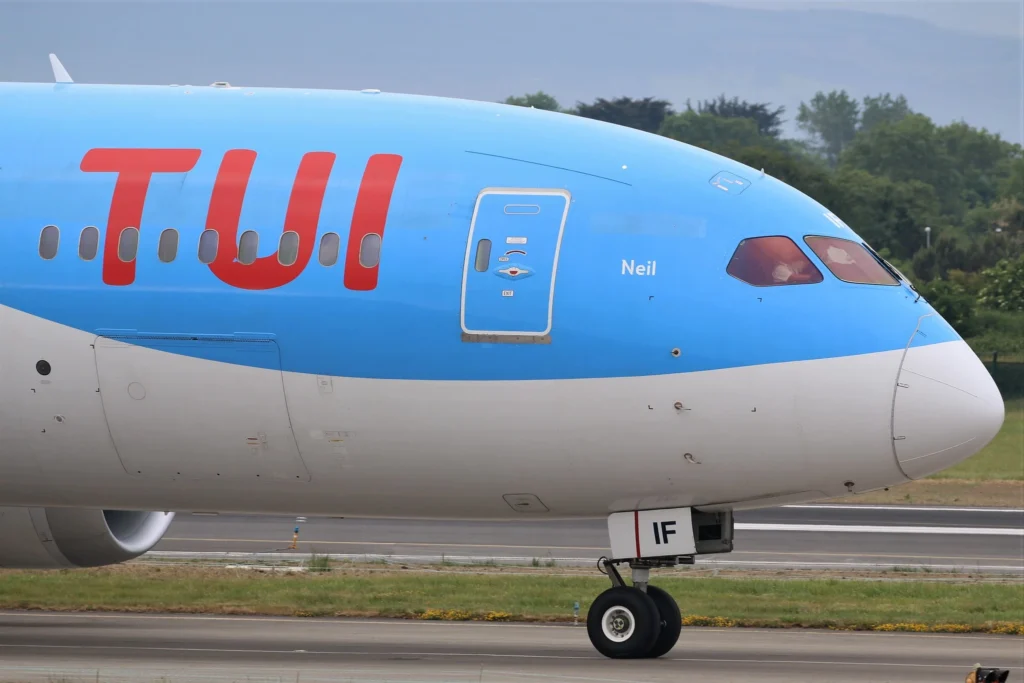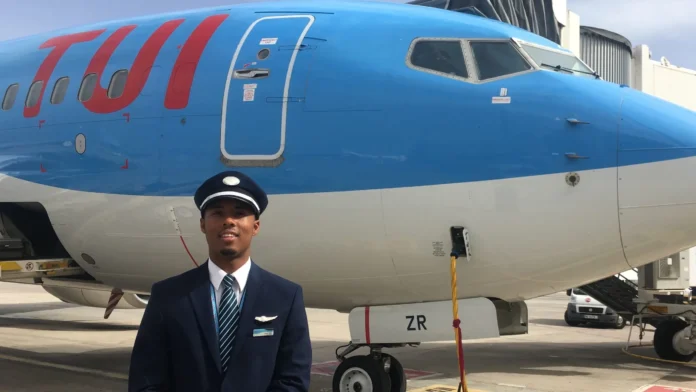TUI Cadet Program is a pilot training offered by TUI Group (Touristik Union International) for candidates with no or little flying experience.
This program helps TUI Group find new pilots and solves the need for more pilots. People can become airline pilots without paying the usual high costs of flight school. The program gives a clear step-by-step path to becoming a pilot for TUI.
Table of contents
- TUI Cadet Program Overview
- What is an MPL License?
- Program Duration and Structure
- Training Location and Facilities
- TUI Cadet Program Application Process
- Eligibility requirements
- Application Guide
- Tips for a successful application
- Financial Funding
- Future Demand for Pilots
- How TUI Cadet Program address Industry Needs?
- Frequently Asked Questions (FAQs)

TUI Cadet Program Overview
TUI trains pilots for its airlines through the TUI Cadet Program. Cadets earn an MPL license that is designed for airline operations. It is a 19-month program that covers most costs, including fees and accommodation.
Applicants must be 18 years old and have a specific General Certificate of Secondary Education (GCSE), and meet physical standards. Training includes ground school, basics of flying, and advanced flying. The applicants that graduates become First Officers on TUI’s Boeing 737s.
TUI accepts applications yearly, usually in January. This program creates skilled pilots and makes the career more accessible by reducing costs.
What is an MPL License?
The MPL stands for Multi-Crew Pilot License. It allows the pilot to work as a co-pilot for multiple aircraft. ICAO created MPL in 2006 as a new path to becoming an airline pilot.
MPL uses competency-based training, unlike older task-based methods. This approach uses modern simulators and focuses on skills for automated cockpits.
Captain Dieter Harms, MPL’s creator, states it wasn’t made to solve pilot shortages or cut costs. By March 2021, 4,018 pilots worldwide had earned MPLs, with 1,358 from Lufthansa (LH) and its subsidiaries.
Program Duration and Structure
TUI’s MPL Cadet Program lasts 19 months. It starts with 750 hours of theoretical training over 6.5 months combined with remote and in-person learning. Practical training follows in four phases:
- Core Flying Skills (4 months): 65 hours in Diamond DA40 aircraft, plus Upset Prevention & Recovery Training.
- Basic Multi-Crew and Instrument Flying (5 months): 144 hours in Boeing 737 fixed base simulator.
- Intermediate Flying (3 months): 16 hours in 737 full flight simulator using TUI procedures.
- Advanced Flying (3 months): Final 737 Type Rating with 20 simulator hours and circuit training.
All practical phases are carried out at TUI-approved facilities. This course structure helps build skills progressively from basic to advanced airline operations.
Training Location and Facilities
TUI’s Training Centre in East Midlands hosts most of the TUI’s Cadet program training. Recruits learn safety procedures, service skills, and other essential airline operations here. This training center ensures consistent, high-quality instruction for all cadets.
TUI Cadet Program Application Process
- Applications close date: January 31, 2025
- Digital interview results: End of March 2025
- Assessment center: Mid-April 2025 at East Midlands Airport
- Simulator tests: Early May 2025 at London Gatwick
- Final decisions: June 2025
Eligibility requirements
Applicants must be 18+ by September 1, 2025. They need five GCSEs, including Math (grade B/6+), English, and Science (grade C/4+).
Candidate should be fluent in English (required). Candidates must have UK work rights and a passport for worldwide travel. The minimum height required for a candidate is 1.58m.
Applicants should swim 25m and meet CAA Class 1 medical requirements. Airport security checks are needed before training starts.
Application Guide
The TUI Cadet Program assessment process consists of five stages. Applicants first submit their application and CV for review. If they meet the criteria, they move to stage two, completing online assessments in verbal, numerical, and logical reasoning within five days.
Stage three involves a one-way digital interview, where candidates record answers to questions within five days. Results will be communicated by late March 2025. Stage four is an assessment day at the UK TUI Training Centre in mid-April, featuring exercises and an individual interview.
The final stage, held in early May, is a flying aptitude test in a UK-based simulator, requiring no prior flying experience.
Passing each stage is necessary to move forward. This structured approach evaluates different skills progressively.
The Application process has 5 stages.
- Stage One: Submitting your application and CV.
- Stage Two: Complete online assessments within 5 days.
- Stage Three: Record a digital interview within 5 days.
- Stage Four: Attend an assessment day at the UK TUI Training Centre.
- Stage Five: Take a simulator flying test.
Tips for a successful application
Prepare thoroughly for each stage. Practice online tests for Stage Two. For the digital interview, rehearse answers and ensure good recording quality. Research TUI and the aviation industry for the assessment day.
Stay calm during the simulator test; no prior flying experience is needed. Meet all deadlines and follow instructions carefully. Showcase your communication skills, problem-solving abilities, and passion for aviation throughout the process.
Financial Funding
The TUI Cadet Program covers training costs which makes pilot education more accessible for the candidate. It includes Pilot course fees, basic and advanced training expenses, MPL pilot license fees, and accommodation during practical stages.
The TUI provides pilot uniforms, ATPL theory exam fees, equipment like manuals and iPads, and Class 1 medical examinations and renewals.
Candidates are responsible for travel, food, living, and other expenses. Upon completing training and joining TUI, cadets receive a salary of £34,938 (post-deduction) for four years, which includes repayment of training costs. This salary increases according to pilot pay agreements. The estimated salary of TUI Pilots after 4 years is around £79K–£163K per year.
The coverage of training expenses by TUI significantly reduces the financial burden on candidates to become a pilot.
This approach helps TUI secure well-trained pilots while offering candidates a valuable opportunity to enter the aviation industry at minimal costs.
Future Demand for Pilots
Boeing predicts a need for 649,000 new commercial pilots worldwide in the next 20 years. Growing markets in Asia and Africa increase demand for qualified pilots.
Many senior pilots in North America and Europe will soon reach mandatory retirement age, creating openings.
Normal job changes also drive demand. Airlines offer better pay, bonuses, and training support to attract applicants. They create “flow-through” programs to streamline training. Airlines and trade groups promote aviation careers through youth outreach, mentoring, and marketing. They advocate for improved STEM education to develop future pilot talent.
Experts forecast substantial growth in pilot demand over the next decade. One study projects a 39% increase in North American pilot job openings from 2023 to 2032.
COVID-19 slowed hiring temporarily, but staffing needs will rise again as its effects fade. Current conditions offer unique opportunities for new pilots, with faster training timelines and quicker paths to flying roles.
How TUI Cadet Program address Industry Needs?
TUI Cadet Program creates skilled pilots to address the global shortage. It covers training and license fees, making pilot careers more accessible. TUI uses MPL training for modern airline needs.
Cadets learn on new simulators and planes for today’s high-tech cockpits. The program trains pilots to TUI’s exact needs. They teach pilots about the company procedures. This reduces extra training time when cadets become First Officers.
TUI secures future pilots by training their own, reducing dependence on the competitive job market. By covering training costs, TUI widens the talent pool.
Frequently Asked Questions (FAQs)
After training, new pilots join TUI and earn £34,938 yearly. This salary lasts 4 years and increases with pilot pay agreements.
TUI’s MPL Cadet Program pays for all training costs. It covers course fees, licenses, housing after phase 1, uniforms, ATPL exams, and equipment. Cadets save money on pilot training through this program.
Yes, you can convert the MPL License to an ATPL License. MPL holders can upgrade to ATPL at age 21. They need 1500 flying hours. This upgrade expands job opportunities for pilots.
Cadet pilots need five GCSEs, including Math (grade B/6), English, and Science (grade C/4). They must be 18+, fluent in English, and meet physical requirements like height and swimming ability.
Join us on Telegram Group for the Latest Aviation Updates. Subsequently, follow us on Google News.
The post TUI Cadet Program 2024: Everything you need to know appeared first on Aviation A2Z.
